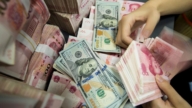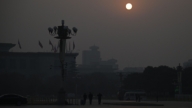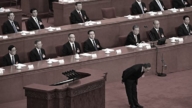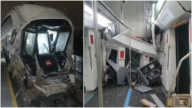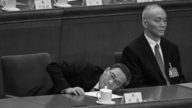【新唐人2013年06月27日讯】中国大陆金融界爆发“钱荒”,且不断加剧。中国人民银行(央行)曾一度表示不会注资救市,但随着股市大跌、触发经济恐慌,央行25号宣布,已经开始对一些金融机构提供资金支持。那么,央行为什么会转变态度呢?下面我们就来听听专家的分析。
中国人民银行在官网发表声明说:已经向一些金融机构提供流动性资金支持,以稳定货币市场利率。
在大陆金融界爆发“钱荒”之后,银行间的隔夜拆借资金不断攀高,最高时达到13%。6月24号,中国多个地方的工商银行更是发生民众无法取款的现象。
在此之前,央行一直坚持不会向金融机构“放水”,不替各银行买单。
对此,美国“南卡罗莱纳大学”艾肯商学院教授谢田分析,中共国务院总理李克强等主管经济的官员,可能不愿继续以前大搞基建的政策,试图从宏观上进行调控冷却,因此“钱荒”出现的时候他们不想注资。
美国南卡罗莱纳大学艾肯商学院教授谢田:“但现在看来,钱荒对中国经济、中国社会、投资者的信心、和国际社会对中国经济的怀疑,整个影响可能太大,它现在又不得不注入部分资金。”
谢田同时指出,如果大陆当局继续增发货币大规模注资的话,必然会加剧通货膨胀和房地产泡沫,中国经济问题会越来越大。但如果央行不注资,也会造成经济恐慌。
谢田认为,中国经济已经陷入进退维谷的两难境地,但从根本上来看,还是中共既得利益集团和老百姓利益如何分配的问题。
美国资深经济分析师经济学家简天伦:“最近因为中央在打压贪污腐败,有很多高官把钱移到海外。所以有些银行账面上可能很多钱,但实际上并不一定有那么多钱。”
据了解,大陆的银行,一直以来就是充当中共政府“钱袋子”的角色。而长期操控金融领域的江派利益集团,更是通过各种手段将银行资产掏空占为己有,反过来,银行又通过增发钞票让老百姓买单。
中共“十八大”之后,中共新领导人习近平、李克强、王岐山等人开始高调反腐,尤其针对金融界。与此同时,中共贪官们一方面把大量资金转移海外,一方面对反腐进行抵制。
“中国人民大学”行政管理学系主任毛寿龙教授也对《新唐人》表示,大陆金融泡沫、地方债占用大量资金、短期存款被用于投资等问题,造成资金紧张,而利益集团则以这些理由来进行操作、逼迫央行放款。
中国人民大学行政管理学系主任毛寿龙:“这几个原因使他们有操作的筹码。中央就去赌这个事情,就是说你能够把存量消化掉、把增量也消化掉。通过盘活存量、改变增量的结构,希望银行自己来解决这个问题。”
受“钱荒”影响,大陆沪深股市24号大跌,25号则先是大跌,而后因央行声明注资而回升,呈现V字形的大幅波动。
北京“天则经济研究所”副所长冯兴元表示,央行这次“放水”虽然缓解了目前的“钱荒”,但实际上大陆已经发生小规模的金融危机。
北京天则经济研究所副所长冯兴元:“这种情况下,我们再搞大规模的城镇化,通过大规模的增加财政支出已经不行了,我们跟08年情况完全不一样。”
2008年全球金融危机时期,中共曾经推出“4万亿”投资计划,来刺激经济发展,但造成了重复投资、房地产泡沫和物价急剧上升等恶果,而这些恶果目前还在不断显现和加剧。
采访/易如 编辑/李谦 后制/黎安安
Central Bank Injects Cash to Ease “Money Shortage”
Facing a heat-up of the “money shortage”,
China’s central bank at first refused cash injection.
However, the stock market’s fall and
economic panic ensued.
On June 25, the central bank announced that liquidity
support had begun, towards some financial institutions.
Why has the central bank changed its attitude?
Let’s see what the experts say.
On its official website, the People’s Bank of China has said
that liquidity has been offered to some financial institutions.
This is allegedly done to stabilize money-market rates.
China’s “money shortage” has pushed up
interbank call-loan rate, up to 13% at the peak.
On June 24, citizens were even unable to withdraw money
from agencies of the Industrial & Commercial Bank of China.
Prior to this development, China’s central bank had refused
to inject cash into the financial system.
Xie Tian, professor at Aiken Business School,
University of South Carolina, offers his analysis.
Xie says premier Li Keqiang and other officials in charge
of economy , may want to discontinue the previous policy.
That is, to stop the focus on infrastructure building.
Li Keqiang and his team may be trying to exercise
a macro-control to cool things down.
Xie Tian speculates that this is why the central bank
failed to inject money earlier on.
Xie Tian: “But now it seems that the money shortage
has caused too negative an effect, on China’s economy,
society, and investor confidence.
It has also aroused the world’s suspicions
over China’s economy.
So, because of this, the central bank
has to inject some funds.”
Xie Tian warns that if the Chinese Communist Party
authorities inject money by printing more paper money,
that will surely fuel inflation and burst the real estate bubble.
This will compound China’s economic problem.
However, if the central bank doesn’t offer cash aid,
it will cause economic panic, Xie Tian remarks.
So far, China’s leaders have been caught in a dilemma,
according to Xie Tian. He points out the core of the problem.
This is the issue of profit sharing between CCP
privileged groups , and ordinary Chinese citizens.
(Senior economist, USA) Jian Tianlun:
“The CCP has launched an anti-corruption drive.
This has caused many senior officials to
transfer their assets abroad.
So some banks in fact haven’t so much money
as the figures shown on their books would suggest.”
China’s banks have always been known as
“money bags” for CCP authorities.
The CCP faction under Jiang Zemin has
long controlled China’s financing sector.
Jiang’s faction members have used all means
to empty banks and pocket the assets.
Whilst the CCP authorities have filled the hole that is left
by printing more money.
After the 18th Party Congress, the CCP’s new
leadership proclaimed it would combat corruption,
especially in the financial sector.
Yet CCP officials have rushed to transfer
their money abroad, so as to resist the anti-graft drive.
Mao Shoulong, professor at Renmin University of China,
tells NTD about more information.
The current money shortage has multiple causes, he says.
These include a financial bubble,
loans being turned into local fiscal debts,
another cause is short-term deposits being used
for investment.
The interest groups have used these as pretexts
to press the central bank to input liquidity.
Mao Shoulong: “They’ve used these reasons to bargain.
So central authorities have gambled on
the injection of money.
But the banks are required to digest currency inventory
and the increment.
The central bank tries to make efficient use of banks’
currency inventory, and to control the injected liquidity.”
Under the “money shortage”, Shanghai and Shenzhen
stock markets fell on June 24.
On June 25, the stock market opened with a drop, and
later saw a V-shaped rebound with a cash injection.
Feng Xingyuan, deputy director of Beijing-based
Unirule Institute of Economics, comments.
The central bank’s cash injection has eased
the money shortage, he says.
Yet, a small financial crisis did happen in China.
Feng Xingyuan: “In this case, if we still carry out
large-scale urbanization to boost fiscal expenditure,
it won’t work anymore.
The situation today is different from what it was in 2008.”
In 2008 the CCP authorities launched a 4-Trillion-yuan
stimulus plan to conquer a global financial crisis.
The scheme finally caused overlapping investment,
a real estate bubble and a sharp rise in prices.
Until today, these disastrous effects still exist
and they are becoming worse.


